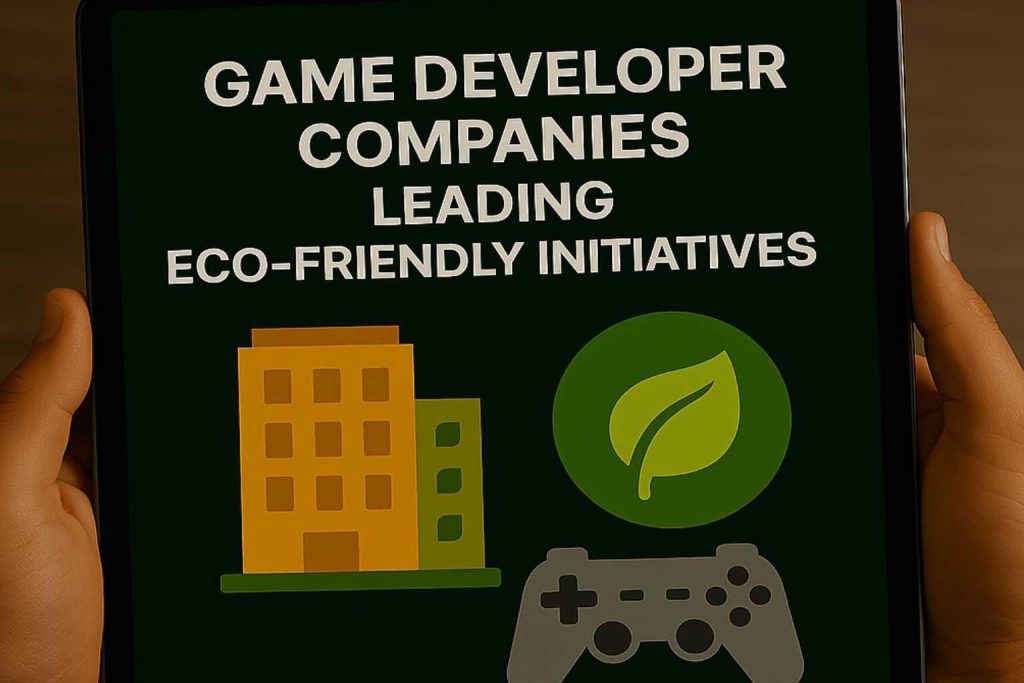Game developer companies are increasingly adopting eco-friendly initiatives. This shift reflects a growing awareness of sustainability in the gaming industry. Mobile game development in Unity is at the forefront of this movement. Developers are leveraging technology to create energy-efficient mobile gaming experiences. By focusing on energy-saving games, they are making a positive impact on the environment. In this article, we will explore how game developer companies are leading the charge towards more sustainable gaming practices.
The Rise of Eco-Friendly Gaming
The concept of eco-friendly gaming is gaining traction as both developers and players become more conscious of the environmental impact of their digital activities. The energy consumption of mobile devices, driven by demanding games, contributes significantly to carbon emissions. With millions of gamers worldwide, the cumulative energy consumption is substantial. Therefore, reducing the carbon footprint of gaming is crucial for sustainability.
In response to these concerns, developers are exploring innovative ways to make gaming more sustainable. This includes the development of games that are optimized for lower energy use, as well as initiatives to offset carbon emissions through renewable energy or carbon credits. Players, too, are becoming more discerning, often favoring games and companies that demonstrate a commitment to environmental responsibility. This shift in consumer behavior is driving the industry to adopt more sustainable practices.
Energy-Saving Games: A New Frontier
Energy-saving games are emerging as a new frontier in the mobile gaming industry. These games are designed to minimize energy consumption without compromising on graphics or gameplay quality. By optimizing algorithms and employing energy-efficient coding practices, developers are creating games that are both entertaining and sustainable.
The creation of energy-saving games involves a multifaceted approach. Developers must strike a balance between maintaining high-quality graphics and reducing energy consumption. This requires innovative coding techniques and a deep understanding of both hardware capabilities and player expectations. As more developers embrace this challenge, energy-saving games are poised to become a standard in the industry, offering players the chance to enjoy their favorite games without guilt.
How AI and Machine Learning Drive Energy Efficiency
AI and ML are revolutionizing mobile game development by enabling smarter, more efficient processes. These technologies are used to analyze player behavior, predict system load, and dynamically adjust game settings to conserve energy. Here’s how they contribute to energy efficiency:
Intelligent Resource Management
AI algorithms can manage resources intelligently, ensuring that a game utilizes only the necessary processing power and memory. By predicting which resources are needed at any given moment, AI helps in minimizing energy consumption, leading to longer battery life for mobile devices. This intelligent resource management is crucial in maintaining a seamless gaming experience while conserving energy.
Moreover, intelligent resource management can extend beyond individual games to influence device-wide energy policies. By integrating AI-driven insights into the operating system, developers can create a holistic approach to energy savings that benefits all applications. This level of integration represents a significant advancement in the pursuit of eco-friendly gaming.
Dynamic Graphics Adjustment
ML models can analyze the device’s current performance capability and adjust graphic settings dynamically. This means that during less demanding scenes, the game can reduce graphics quality temporarily, saving energy without affecting the player’s experience. Dynamic graphics adjustment ensures that players receive the best possible experience in terms of both performance and sustainability.
The ability to adjust graphics on the fly also opens up new opportunities for personalization. Players can choose to prioritize either performance or energy efficiency, allowing for a customized gaming experience that aligns with their personal values. This level of control can enhance player satisfaction and foster a deeper connection to the game.
Predictive Load Balancing
By employing AI, games can predict when a device is likely to experience high load and adjust accordingly. This can involve pre-loading assets during downtime or optimizing code execution to prevent sudden spikes in power usage. Predictive load balancing ensures a smooth gaming experience while minimizing energy consumption.
This approach not only benefits individual games but can also contribute to the overall stability and efficiency of mobile devices. By reducing the likelihood of performance bottlenecks, predictive load balancing can extend the lifespan of devices, further reducing their environmental impact. This innovation showcases the potential of AI to create sustainable solutions that benefit both players and the planet.
The Role of Game Developer Companies
Game development companies are at the forefront of this eco-friendly revolution. Pioneering studios are incorporating energy-efficient practices into their development processes, leveraging AI and ML to create games that are not only engaging but also environmentally responsible. This movement is setting a new standard for the industry, encouraging others to follow suit.
These companies are also playing a critical role in raising awareness about the importance of sustainability in gaming. By sharing their successes and challenges, they are helping to create a culture of transparency and collaboration. This openness is essential for driving innovation and inspiring others to embrace eco-friendly practices.
Mobile Game Development in Unity
Unity, a popular game development platform, is actively supporting energy-efficient mobile game development. With tools and frameworks designed for optimizing performance, Unity allows developers to create games that are both visually stunning and resource-efficient. The platform’s AI capabilities enable developers to implement energy-saving features seamlessly.
Unity’s commitment to sustainability extends beyond its tools and technologies. The company is also involved in initiatives to promote eco-friendly practices within the gaming community. By hosting events, providing educational resources, and fostering a supportive network, Unity is helping to drive the industry’s transition towards more sustainable practices.
Collaborations and Innovations
Collaborations between tech companies, academic institutions, and game developers are driving innovations in eco-friendly gaming. By pooling resources and expertise, these partnerships are creating new standards for energy efficiency in the gaming industry. Such collaborations are crucial for overcoming the challenges associated with developing energy-efficient games.
These partnerships also provide a platform for sharing knowledge and best practices. By working together, stakeholders can accelerate the development of new technologies and solutions that benefit the entire industry. This spirit of collaboration is essential for fostering a culture of innovation and sustainability in gaming.
Challenges and Opportunities
While the push towards energy-efficient gaming presents numerous opportunities, it also poses challenges. Developers must balance the need for high-quality graphics and immersive gameplay with the imperative of reducing energy consumption. However, as AI and ML technologies continue to evolve, the potential for creating sustainable gaming experiences is immense.
The challenges faced by developers are not insurmountable. By investing in research and development, the industry can overcome technical hurdles and create games that are both engaging and environmentally responsible. As these technologies become more accessible, the opportunities for innovation and growth in eco-friendly gaming will continue to expand.
Overcoming Technical Hurdles
Developers face technical hurdles in optimizing games for energy efficiency, such as managing complex AI algorithms and ensuring compatibility across different devices. Continuous research and development are essential to overcoming these challenges. By staying at the forefront of technological advancements, developers can create solutions that meet the demands of modern gaming.
Education and training also play a critical role in overcoming these hurdles. By equipping developers with the skills and knowledge needed to implement energy-efficient practices, the industry can ensure a smooth transition towards sustainability. This commitment to education is essential for fostering a new generation of developers who prioritize eco-friendly gaming.
Fostering a Greener Gaming Community
Educating gamers about the benefits of energy-efficient games can foster a community that values sustainability. By promoting awareness and encouraging players to choose eco-friendly games, the industry can drive demand for greener gaming options. This shift in consumer behavior is essential for motivating developers to prioritize sustainability.
Building a greener gaming community also involves creating spaces for dialogue and collaboration. By providing platforms for players, developers, and other stakeholders to share their experiences and ideas, the industry can foster a culture of innovation and responsibility. This community-driven approach is crucial for creating a sustainable future for gaming.
The Future of Energy-Efficient Mobile Gaming
The future of mobile gaming is undeniably intertwined with the principles of sustainability. As AI and ML technologies advance, we can expect even more sophisticated energy-saving techniques to emerge. The gaming industry has the potential to set a precedent for other digital sectors, showcasing how technology can be harnessed for environmental good.
The path towards a more sustainable gaming industry is paved with opportunities for innovation and growth. By embracing the principles of sustainability, the industry can create a future where technology and the environment coexist harmoniously. This vision of the future is one where gaming not only entertains but also contributes to the well-being of our planet.
Encouraging Industry-Wide Adoption
For energy-efficient gaming to become a standard, industry-wide adoption is necessary. Game developers, publishers, and tech companies must collaborate to establish best practices and create benchmarks for sustainability in gaming. This collective effort is essential for driving meaningful change and ensuring that eco-friendly practices become the norm.
Industry-wide adoption also involves engaging with policymakers and regulators to create supportive frameworks for sustainable gaming. By advocating for policies that promote energy efficiency and environmental responsibility, the industry can create a regulatory environment that supports its sustainability goals. This collaboration between industry and government is essential for achieving lasting change.
Inspiring the Next Generation
As we look to the future, inspiring the next generation of game developers to prioritize sustainability will be crucial. Educational programs and initiatives that emphasize the importance of eco-friendly gaming can empower young developers to innovate responsibly. By instilling a sense of environmental stewardship, the industry can ensure a sustainable future for gaming.
Mentorship and community engagement are also important for inspiring the next generation. By providing opportunities for young developers to connect with industry leaders and learn from their experiences, the industry can foster a culture of innovation and responsibility. This commitment to nurturing talent is essential for creating a sustainable future for gaming.
Conclusion
In conclusion, the integration of AI and ML in mobile game development is paving the way for energy-efficient gaming. By embracing these technologies, developers are not only enhancing gameplay experiences but also contributing to a more sustainable future. As the gaming industry continues to evolve, the commitment to eco-friendly practices will play a critical role in shaping the digital landscape.
The journey towards greener gaming is just beginning, and with continued collaboration and innovation, the possibilities are limitless. Let’s embrace the challenge and lead the charge towards a more sustainable gaming world. By working together, we can create a future where gaming is not only a source of entertainment but also a force for environmental good.
FAQ
1. What are eco-friendly gaming practices?
Eco-friendly gaming practices refer to the methods and strategies that game developer companies implement to reduce environmental impact. This includes creating energy-efficient games, utilizing sustainable materials in production, and promoting digital distribution to reduce carbon emissions.
2. How are game developer companies leading sustainability efforts?
Game developer companies are leading sustainability efforts by adopting energy-efficient coding practices, partnering with environmental organizations, and raising awareness about the importance of reducing carbon footprints in gaming.
3. What role does Unity play in mobile game development?
Unity is a popular game development platform that provides tools for creating energy-efficient games. It supports developers in optimizing performance and integrating AI features to enhance sustainability in mobile games.
4. Why is energy efficiency important in mobile gaming?
Energy efficiency in mobile gaming is crucial because it helps minimize the carbon footprint associated with high energy consumption. It also promotes longer battery life for devices, enhancing user experience while being environmentally responsible.
5. How can players contribute to eco-friendly gaming?
Players can contribute to eco-friendly gaming by supporting games and developers that prioritize sustainability, engaging in eco-conscious gaming communities, and spreading awareness about the importance of energy-efficient practices in the industry.

